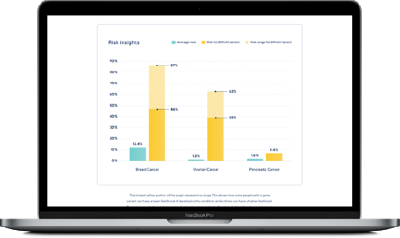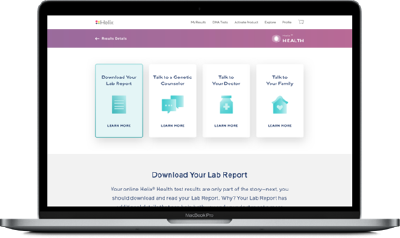Participant Resources
Prepare for your virtual appointment with a Genomic Representative
Login to MyChart
View and Read Messages from your Genomic Representative
Read your consent form prior to your appointment
Join your virtual visit, Ask Questions & Sign consent
The Genomic Representative will help you get scheduled for any follow-up appointments or testing as part of the study/studies.
HOW TO GET YOUR GENETIC RESULTS
Participants enrolled after December 2020 Your clinical results will be uploaded into MyChart and on Helix Health. Your ancestry and wellness insights will be uploaded into Helix Health.

YOUR HELIX ACCOUNT
Log in to your Helix account to access your secure results.
The Healthy Nevada Project does not store your login account information. Your results can be found by logging into your account and clicking the “My Results” tab.
Still have questions? Call us at (775) 982-6914
Participants enrolled from Helix Health study launch in 2018 until December 1, 2020 For the health portion of your results where we test for genetic risk factors that may be medically relevant to your health, results are only delivered to participants who are discovered to have a clinical variant for the conditions we are currently testing for, and have consented to be contacted regarding those results. All participants are screened for Hereditary Breast and Ovarian Cancer Syndrome, Lynch Syndrome, and Familial Hypercholesterolemia.
If we do not detect a clinical concern, your genetic information is kept de-identified and secure in our research database to protect your privacy. If you did not hear back from us that simply means that the researchers did not find a genetic variant for those specific health risks we are testing for to date. In other words, no news is good news!
Participants enrolled before 2018 you will need to re-consent and re-test to be able to view results through Helix Health.
Unsure of when you participated? Call us we can help! 775-982-6914
HELIX HEALTH


The Helix Health screening looks at specific locations in your DNA to tell you if you have any identifiable changes, or variants, in your DNA that could put you at increased risk for developing certain hereditary conditions. Specifically, the test will tell you about three conditions:
- A hereditary form of very high cholesterol that causes heart disease at an earlier age than the general population, known as familial hypercholesterolemia (FH)
- A hereditary form of breast and ovarian cancer syndrome (HBOC), specifically the BRCA1 and BRCA2 genes
- A hereditary type of colorectal cancer known as Lynch syndrome
These conditions have been selected because they are actionable. That means if you know you have an increased risk based on your DNA, there are steps you and your healthcare providers can take to reduce or address your health risks. The health risks associated with these conditions are part of a spectrum—some variants can cause a higher risk than others. The results, both positive or negative, will be included in your health record and on your Helix account to assist with your health care plan. If you have inherited specific variants related to any of these three conditions a healthcare professional or licensed genetic counselor will contact you.
Often, your risk for developing certain health conditions is estimated based on your family’s medical history. While very useful, our knowledge of our own family history can be incomplete for a number of reasons. For example, the exact diagnosis given to a relative may not be known by all family members, either because the individual didn’t want to share that information or simply because medical terminology can be difficult to remember. It’s also possible that members of your family have a genetic variant that increases their odds of disease, yet they never developed symptoms. In some cases, having a variant doesn’t guarantee that you will develop symptoms, meaning you and your family may be unaware of your increased risks. Helix Health can help to fill in these gaps.
If you have a personal or family history of a condition covered by this screening, you may want to speak with a genetic counselor or your doctor about whether additional or different genetic testing may be appropriate for you.
A genetic counselor is a medical professional specifically trained to help you understand how your genetic information may impact you and your family’s health. A genetic counselor can review your personal and family history, help you understand your results, discuss medical recommendations, and help you put those into action with your healthcare provider(s). They can also help you understand how your results may, or may not, affect your biological relatives, and how you can approach sharing any important information.
